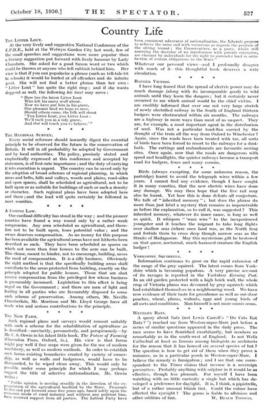Such regional plans and surveys would consort suitably with such
a scheme for the rehabilitation of agriculture as is described—succinctly, persuasively, and perspicuously—by Air. C. S. Orwin in his latest little book, The Future of Farming (Clarendon Press, Oxford, 5s.). His view is that farms might pay well if free scope were given for the use of modern machinery, as well as modern methods. In order to establish such farms existing boundaries created by variety of owner- Ai)), as well as walls and hedgerows, would have to be disregarded, to be wiped clean away. This would only be Possible under some principle for which I may perhaps suggest the title of selective nationalization. Mr. Orwin writes : "Public opinion is moving steadily in the direction of the ex- propriation of the agricultural landlord by the State. Proposals to this end put forward some five years ago, based solely upon the economic needs of rural industry and without any political bias, have received support from all parties. The Labour Party have
been consistent advocates of nationalization, the Liberals propose to achieve the same end with variations as regards the position of the sitting tenant the Conservatives, as a party, whilst still asserting the doctrine of no interference with private enterprise. are clamant by individuals for the right to surrender land in satis- faction of certain obligations to the State."
Whatever our personal views—and I profoundly disagree with much of it—this thoughtful book deserves a wide circulation.
























































 Previous page
Previous page